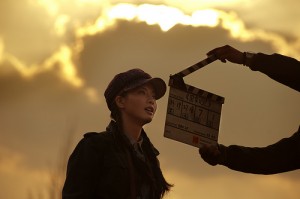Kate Iles – Challenging Times on Channel 4

In September 1992 Channel 4 put an ad in Broadcast calling for a production company to run their latest scheme for attracting new, young talent to the Channel – a film competition, aimed at young writers and directors to be sponsored by Lloyds Bank and commissioned by the Youth Department.
I was running a fledgling company, Compulsive Viewing Ltd, with producer Maddie French and director Coky Giedroyc from an attic in Tufnell Park. Our latest C4 production, a 4x60min documentary series called “Catholics and Sex” had been broadcast over the summer and our 10% production fee was rapidly being whittled away in office rent and development research trips.
We desperately needed a new commission and since we already had reasonable form with the Youth Department – Maddie had previously run RPM Productions which had provided much of the Youth output in the 80s, and Compulsive Viewing had made a short for Youth Commissioning Editor Steven Garrett the previous year – this was an obvious project to pitch for. We stayed up all night, roped in some advertising friends to write a publicity campaign for the project, and delivered the pitch to 60 Charlotte St in a taxi ten minutes before the deadline for submissions….
After a pretty gruelling interview process involving the surprisingly unstuffy and culturally aware sponsorship manager from Lloyds and Bill Hilary who’d recently taken over the C4 Youth Department, we won the contract. And immediately realised we had absolutely no idea what we were doing…
We’re pleased to introduce here a guest blog from Kate Iles, who lectures in film and TV production at Roehampton and Southampton Solent universities. Kate spoke about the Lloyd’s Bank Film Challenge – the subject of this blog – at our project conference – listen to the full audio by clicking here…
There were other short film schemes around at the time – I think Film Four were running Short and Curlies by then and BBC 2 had set up 10×10 – but they were aimed at writers and directors who already had a foothold in the industry. The whole point about this scheme was that it had been designed by Lloyds to attract very young people before they’d opened their first bank account – the cut off point for writers was 19 and we managed to persuade them to extend the age limit for directors to 25 – and yet they’d somehow persuaded Channel 4 to guarantee prime time broadcast slots for the resulting films to maximise the Bank’s exposure. So we were faced with the alarming prospect of producing a series of amateurish children’s films with novice directors to be broadcast in the full glare of a prime time mid week slot. The whole project seemed destined to be a humiliating, high-profile disaster.
And yet somehow, 18 months later we managed to produce a series of short films which, in retrospect, showcased the first work of some of the most successful professionals currently working in the industry. 1500 writers and 350 directors had entered, 30 shortlisted entries were workshopped with industry luninaries including Stephen Moffat and Tim Firth and eventually 6 films were selected for production with a budget of around £35k each. Of these, Simon Beaufoy (The Full Monty) directed a documentary film, “Hippy Critical” about a teenager rebelling against her flower power mother, Justin Chadwick (The Other Boleyn Girl) directed an unknown Ewan McGregor in “Family Style”, a gritty drama about adolescent bereavement, Susan Nickson (Two Pints of Lager and a Packet of Crisps Please) wrote a hilarious and surreal teenage rant, “Buddha’s Legs”, and Myfanwy Moore devised a game show and went on to run the New Comedy Department at the BBC.
There were a few, er, rough moments especially when, as one of the typically idiosyncratic small indies spawned by the early years of Channel 4, we found ourselves caught between the competing egos of Channel executives, Lloyds Bank suits and an ambitious but relatively unknown PR company attached to the project called Freud Communications. Nevertheless the project ran for another 5 years until in 1998 Lloyds got a new sponsorship manager who liked rugby more than films and we lost our funding.
I still find myself spotting familiar names in TV credits and on cinema bill boards and recognising them as Film Challenge “alumni” – David Mackenzie, Allan Niblo, Tom Shankland, Dan Zeff, Julian Kemp to name a few – and I know that for many of these directors and writers a 10 minute fully-funded short, shot on 16mm with a professional crew and broadcast on Channel 4 was a really valuable passport to success.
I’m trying to trace any of the other 25 writers and directors we worked with over four series of the Film Challenge with a view to writing a paper analysing the scheme’s overall contribution to the UK film industry. If anyone knows any of those involved please get in touch via the blog.
KATE ILES.

 Learning on Screen
Learning on Screen